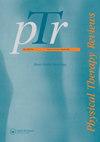物理治疗课程中以人为中心的实践教学:文献综述
IF 0.8
Q4 REHABILITATION
引用次数: 4
摘要
摘要背景人们越来越期望医疗保健应关注患者个体的需求,以以人为本的实践哲学为中心提供护理。鉴于以人为中心的实践的重要性,有必要了解课程是如何为理疗学生以以人为本的方式工作做好准备的。目的本文献综述的目的是探索与教育干预相关的实证研究,以在物理治疗资格预审课程中教授以人为本的实践。方法对6个电子文献数据库进行系统检索,以确定相关研究。提取数据并进行专题和叙述综合分析。结果通过搜索策略共确定了1621项研究,并根据纳入/排除标准进行了筛选。八项研究符合纳入标准(五项定性研究、两项定量研究和一项混合方法)。从学生的角度确定了教育干预措施的三个主题:对学习的积极影响;创造一个安全、真实、以人为本的学习环境;以及改变观点方面的挑战。定量研究表明,干预措施加强了以人为中心的实践学习。结论广泛的教育干预措施被用于教授以人为中心的实践,这似乎对学生的学习产生了积极影响,并导致以人为中心实践更加敏感。需要进一步研究,以了解以人为中心的实践教学干预措施是否会转化为临床实践中行为的改变,从而为接受理疗服务的人带来好处。本文章由计算机程序翻译,如有差异,请以英文原文为准。
Teaching person-centred practice in physiotherapy curricula: a literature review
Abstract Background There is a growing expectation that healthcare should focus on the needs of the individual patient with the philosophy of person-centred practice as the central model for care delivery. Given the importance of person-centred practice, there is a need to understand how curricula are preparing physiotherapy students for working in a person-centred manner. Objectives The aim of this literature review was to explore empirical studies relating to educational interventions to teach person-centred practice in physiotherapy pre-qualifying curricula. Methods A systematic search was conducted across six electronic bibliographic databases to identify relevant studies. Data were extracted and analysed with thematic and narrative synthesis. Results A total of 1621 studies were identified through the search strategy and screened against the inclusion/exclusion criteria. Eight studies met the inclusion criteria (five qualitative, two quantitative, and one mixed methods). Three themes were identified from the student perspective on the educational interventions: positive impact on learning; creating a safe, authentic, person-centred learning environment; and challenges in changing views. Quantitative studies suggested the interventions enhanced learning on person-centred practice. Conclusions A wide range of educational interventions were used to teach person-centred practice which appeared to have a positive impact on student learning and led to a greater sensitivity of person-centred practice. Further research is needed to understand whether educational interventions to teach person-centred practice translate to changed behaviour in clinical practice to the benefits of those receiving physiotherapy services.
求助全文
通过发布文献求助,成功后即可免费获取论文全文。
去求助
来源期刊

Physical Therapy Reviews
REHABILITATION-
CiteScore
1.30
自引率
0.00%
发文量
26
期刊介绍:
Physical Therapy Reviews is an international journal which aims to publish contemporary reviews, discussion papers and editorials within physical therapy, and in those basic and clinical sciences which are the basis of physical therapy. The journal is aimed at all those involved in research, teaching and practice within the area of physical therapy. Reviews (both descriptive and systematic) are invited in the following areas, which reflect the breadth and diversity of practice within physical therapy: •neurological rehabilitation •movement and exercise •orthopaedics and rheumatology •manual therapy and massage •sports medicine •measurement •chest physiotherapy •electrotherapeutics •obstetrics and gynaecology •complementary therapies •professional issues •musculoskeletal rehabilitation
 求助内容:
求助内容: 应助结果提醒方式:
应助结果提醒方式:


